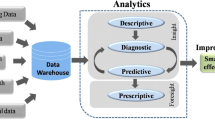Abstract
In this paper, we address the problem of assessing the social value of open data. While the number of open data initiatives increases and many data sets are currently available to lay people, common citizens and end users, a still limited number of studies specifically address how to improve open data understandability, their usability by common users and the measurability of their value in terms of concrete outcomes and benefits for the intended communities and the individual who appropriate those data, to make them more personal and hence more valuable. Our goal is to contribute to the success of open data initiatives by defining a methodology by which to assess their perceived social value. In this paper, we present the conceptual content of the methodology, that is its main concepts and logic structure, and discuss it by means of an empirical user study in which we applied it to real-life open data sets and involving a large sample of prospective consumers of those open data. In particular, we focus on the health care domain in order to improve the welfare of the citizens that need health care services and use the Web to look for relevant information to address those situated needs. Among our main findings, we discovered a clear preference for visual information formats by women with respect to men, and a clear preference for hospitals ranking by disease for senior people with respect to younger.









Similar content being viewed by others
Notes
More precisely, open data are those data that “anyone can freely access, use, modify, and share for any purpose”, that is provided either in the public domain or under an open license - see http://opendefinition.org/
For instance, the NASA could want to make those documents openly available to increase the amount of donations to the agency, so as to exert use value; conversely, the taxpayer would perceive symbolic value.
Merriam-Webster Dictionary, definition of Social. Accessed on the 10th of December 2017, https://www.merriam-webster.com/dictionary/social
References
Aihara, K., Imura, H., Piao, B., Takasu, A., Tanaka, Y. (2017). Mobile Crowdsensing to Collect Road Conditions and Events. In Smart Sensors at the IoT Frontier (pp. 271–297): Springer International Publishing.
Antons, D., Salge, T.O., Barrett, M., Kohli, R., Oborn, E. (2015). The Social Value of Information Technology: How IT Investments Enhance Hospital Reputation. In Academy of Management Proceedings, 2015(1), 16671. Academy of Management.
Arnstein, S.R. (1969). A ladder of citizen participation. Journal of the American Institute of Planners, 35(4), 216–224.
Batini, C., & Locoro, A. (2015). Putting open data to the test of life: conceptual schemas as a means to compare and measure social value. In Proceedings of SEDB 2015.
Berg, M. (1999). Accumulating and coordinating: occasions for information technologies in medical work. Computer Supported Cooperative Work (CSCW), 8(4), 373–401.
Bertin, J. (1983). Semiology of graphics: diagrams, networks, maps.
Bonatsos, A., Middleton, L., Melas, P., Sabeur, Z. (2013). Crime open data aggregation and management for the design of safer spaces in urban environments. In International Symposium on Environmental Software Systems (pp. 311–320). Berlin: Springer.
Boztepe, S. (2007). User value: competing theories and models. International Journal of Design, 1(2).
Cabitza, F., & Locoro, A. (2017). Human-Data Interaction in health care. In Smart Technology Applications in Business Environments, 184-203, IGI Global. https://doi.org/10.4018/978-1-5225-2492-2.ch009.
Cabitza, F., Locoro, A., Batini, C. (2015). A user study to assess the situated social value of open data in health care. Procedia Computer Science, 64, 306–313.
Cabitza, F., Cerroni, A., Locoro, A., Simone, C. (2014). The Knowledge-stream Model - A Comprehensive Model for Knowledge Circulation in Communities of Knowledgeable Practitioners. In 2014 Proceedings of KMIS (pp. 367–374).
Cabitza, F., & Locoro, A. (2014). Made with Knowledge: Disentangling the IT Knowledge Artifact by a qualitative literature review. In 2014 Proceedings of KMIS (pp. 64–75).
Crabtree, A., & Mortier, R. (2015). Human data interaction: Historical lessons from social studies and CSCW. In ECSCW 2015: Proceedings of the 14th European Conference on Computer Supported Cooperative Work, 19-23 September 2015, Oslo, Norway (pp. 3–21): Springer International Publishing.
Dwivedi, Y.K., Janssen, M., Slade, E.L., Rana, N.P., Weerakkody, V., Millard, J., Snijders, D. (2017). Driving innovation through big open linked data (BOLD): exploring antecedents using interpretive structural modelling. Information Systems Frontiers, 19(2), 197–212.
Eysenbach, G., & Kohler, C. (2002). How do consumers search for and appraise health information on the world wide web? Qualitative study using focus groups, usability tests, and in-depth interviews. Bmj, 324(7337), 573–577.
Gregor, S. (2006). The nature of theory in information systems. MIS Quarterly, 611–642.
Hevner, A., & Chatterjee, S. (2010). Design research in information systems: theory and practice Vol. 22. Berlin: Springer.
Hossain, M.A., Dwivedi, Y.K., Rana, N.P. (2016). State-of-the-art in open data research: Insights from existing literature and a research agenda. Journal of organizational computing and electronic commerce, 26(1-2), 14–40.
Huijboom, N., & Van den Broek, T. (2011). Open data: an international comparison of strategies. European Journal of ePractice, 12(1), 4–16.
Janssen, M., Charalabidis, Y., Zuiderwijk, A. (2012). Benefits, adoption barriers and myths of open data and open government. Information Systems Management, 29(4), 258–268.
Kroeger, A., & Weber, C. (2014). Developing a conceptual framework for comparing social value creation. Academy of Management Review, 39(4), 513–540.
Lave, J. (1996). Understanding practice: perspectives on activity and context. Cambridge: Cambridge University Press.
Lieberman, H., Paternó, F., Klann, M., Wulf, V. (2006). End-user development: an emerging paradigm. End user development, (pp. 1–8). Norwell: Kluwer.
Lingane, A., & Olsen, S. (2004). Guidelines for social return on investment. California Management Review, 46(3), 116–135.
Locoro, A., Cabitza, F., Actis-Grosso, R., Batini, C. (2017). Static and interactive infographics in daily tasks: A value-in-use and quality of interaction user study. Computers in Human Behavior, 71, 240–257. https://doi.org/10.1016/j.chb.2017.01.032.
Moore, M.H. (1995). Creating public value: strategic management in government. Cambridge: Harvard University Press.
Mossaed, S., Leonard, K., Eysenbach, G. (2015). Patient preferences and perspectives on accessing their medical records. Journal of Medical Imaging and Radiation Sciences, 46(2), 205–214.
Pereira, G.V., Macadar, M.A., Luciano, E.M., Testa, M.G. (2017). Delivering public value through open government data initiatives in a Smart City context. Information Systems Frontiers, 19(2), 213–229.
Schmidt, K., & Bannon, L. (1992). Taking CSCW seriously. Computer Supported Cooperative Work (CSCW), 1(1-2), 7–40.
Seppänen, J.T., Forsman, J.T., Mönkkönen, M., Thomson, R.L. (2007). Social information use is a process across time, space, and ecology, reaching heterospecifics. Ecology, 88(7), 1622–1633.
Solomon, J., Scherer, A.M., Exe, N.L., Witteman, H.O., Fagerlin, A., Zikmund-Fisher, B.J. (2016). Is This Good or Bad?: Redesigning Visual Displays of Medical Test Results in Patient Portals to Provide Context and Meaning. In Proceedings of CHI 2016 (pp. 2314-2320). ACM.
Stern, D.I. (1999). Use value, exchange value, and resource scarcity. Energy Policy, 27(8), 469–476.
Sweeney, J.C., & Soutar, G.N. (2001). Consumer perceived value: The development of a multiple item scale. Journal of retailing, 77(2), 203–220.
United Nations. (2015). General Assembly Resolution A/RES/70/1. Transforming Our World, the 2030 Agenda for Sustainable Development. Available from: http://www.un.org/ga/search/view_doc.asp?symbol=A/RES/70/1&Lang=E.
Walker, J., Frank, M., Thompson, N. (2015). User Centred Methods for Measuring the Value of Open Data. In Proceedings of the 3rd International Open Data Conference, May 28-29, 2015, Ottawa, Canada.
Wang, R.Y., & Strong, D.M. (1996). Beyond accuracy: what data quality means to data consumers. Journal of Management Information Systems, 5–33.
Weerakkody, V., Irani, Z., Kapoor, K., Sivarajah, U., Dwivedi, Y.K. (2017). Open data and its usability: an empirical view from the Citizen’s perspective. Information Systems Frontiers, 19(2), 285–300.
Zeleti, F.A., & Ojo, A. (2017). Open data value capability architecture. Information Systems Frontiers, 19 (2), 337–360.
Zuiderwijk, A., & Janssen, M. (2014). Barriers and development directions for the publication and usage of open data: a socio-technical view. In Gasco-Hernandez, M. (Ed.) Open Government (pp. 115–135). New York: Springer.
Author information
Authors and Affiliations
Corresponding author
Rights and permissions
About this article
Cite this article
Cabitza, F., Locoro, A. & Batini, C. Making Open Data more Personal Through a Social Value Perspective: a Methodological Approach. Inf Syst Front 22, 131–148 (2020). https://doi.org/10.1007/s10796-018-9854-7
Published:
Issue Date:
DOI: https://doi.org/10.1007/s10796-018-9854-7




